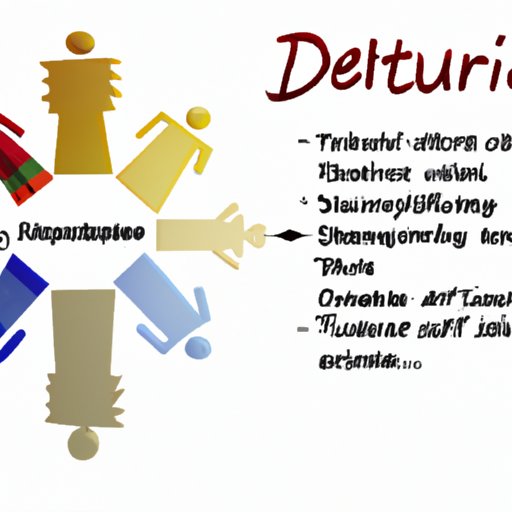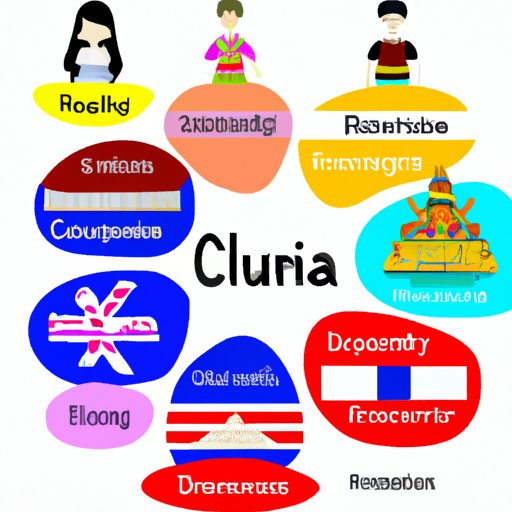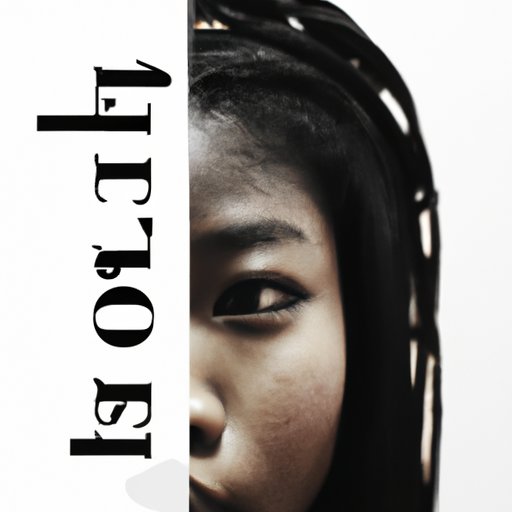Introduction
Culture is a complex concept that is often difficult to define. It is composed of various elements, such as language, customs, beliefs, values, and social norms, which are all passed down through generations. It is an integral part of a person’s identity and can have a profound impact on their behavior and way of life. This article will explore the concept of culture and examine its role in society, as well as how it has been impacted by globalization.

Defining Culture: An Overview of the Concept
The term “culture” encompasses a wide range of aspects, from language and customs to beliefs and values. It is a shared set of experiences and knowledge that is passed down through generations. It is also a social construct, meaning that it is constantly evolving and changing as people interact with one another. The components of culture can vary greatly depending on the region or country in which it is found.
Culture plays an important role in society. It provides individuals with a sense of belonging and purpose, as well as a way to express themselves. It also serves to create a sense of unity among members of a particular group or society. By understanding and respecting different cultures, people can learn to appreciate and accept one another’s differences, thus creating a more harmonious environment.
Exploring the Role of Culture in Society
Culture is composed of many different components, including cultural norms, values, and beliefs. Cultural norms are the accepted behaviors and attitudes of a particular group or society. They can include rules and regulations, as well as expectations for how people should behave in certain situations. Values and beliefs are the shared principles and ideals that guide individuals in their day-to-day lives. They are often deeply rooted in tradition and can shape an individual’s actions and decisions.
Culture can be divided into two main categories: traditional cultures and modern cultures. Traditional cultures are those that have remained largely unchanged over time and are typically passed down through generations. They are often characterized by their close ties to nature and their reliance on ancient customs and beliefs. Modern cultures, on the other hand, are those that have been shaped by globalization and technological advancements. They are characterized by their emphasis on progress and innovation.
Examining the Impact of Cultural Norms
Cultural norms play an important role in society, as they provide individuals with a sense of structure and guidance. Rules and regulations help to maintain order and ensure that everyone is treated fairly and respectfully. Values and beliefs help to shape an individual’s behavior and give them a sense of purpose. Social interactions are also affected by cultural norms, as they determine how people interact with one another and how they express themselves.
Cultural norms can also have a negative impact on society. For example, certain norms may discourage certain types of behavior or activities, such as creativity or risk-taking. They can also lead to discrimination or exclusion of certain groups of people. It is important to be aware of the potential consequences of cultural norms and strive to create an environment that is inclusive and respectful of all individuals.

Understanding Different Types of Cultures
Traditional cultures are often closely tied to nature, relying heavily on ancient customs and beliefs. They are typically passed down through generations, with little or no outside influence. These cultures tend to be more conservative and resistant to change. Examples of traditional cultures include Native American cultures, African cultures, and Asian cultures.
Modern cultures, on the other hand, are those that have been shaped by globalization and technological advancements. These cultures are often characterized by their emphasis on progress and innovation. Examples of modern cultures include Western cultures, which have been heavily influenced by the industrial revolution, and global cultures, which have been shaped by international trade and travel.
Globalization has had a significant impact on culture. Technology and communication have enabled people to connect with one another across vast distances, while migration and diaspora have led to increased cultural exchange. This has resulted in the emergence of new cultures and the blending of existing ones.
Analyzing the Influence of Globalization on Culture
Technology and communication have had a major impact on culture. The internet and social media have made it easier for people to stay connected, regardless of where they are in the world. This has enabled individuals to share ideas and experiences, as well as to access information from around the globe. Additionally, advances in transportation have resulted in increased migration and diaspora, leading to increased cultural exchange.
Cultural exchange is the process of sharing and exchanging cultural practices and beliefs. It can take many forms, from the sharing of stories and traditions to the adoption of new technologies and customs. Globalization has facilitated this process, making it easier for people to interact with one another and share their experiences.

Investigating the Relationship Between Culture and Identity
Culture plays an important role in shaping an individual’s identity. It provides individuals with a sense of belonging and purpose, as well as a way to express themselves. People who identify with a particular culture often feel a strong connection to it and strive to preserve its values and traditions.
Cultural differences can also have an impact on identity. Individuals may find themselves feeling out of place when exposed to a new culture, or they may struggle to reconcile their own beliefs and values with those of the new culture. It is important to recognize and respect these differences in order to foster understanding and acceptance.
Preservation of cultural values is also important. It helps to ensure that the culture continues to thrive and evolve, while still remaining true to its roots. This can be done through education, as well as through the support of local and global initiatives that promote cultural diversity and understanding.
Conclusion
In conclusion, culture is a complex and ever-evolving concept. It is composed of many different elements, such as language, customs, beliefs, values, and social norms, which are all passed down through generations. It plays an important role in society, providing individuals with a sense of belonging and purpose. Additionally, globalization has had a major impact on culture, resulting in increased cultural exchange and the emergence of new cultures.
Finally, culture has a direct impact on an individual’s identity. It provides individuals with a sense of belonging and helps to shape their behavior and way of life. It is important to recognize and respect cultural differences in order to foster understanding and acceptance. Further research is needed to better understand the role of culture in society and its impact on identity.
(Note: Is this article not meeting your expectations? Do you have knowledge or insights to share? Unlock new opportunities and expand your reach by joining our authors team. Click Registration to join us and share your expertise with our readers.)
